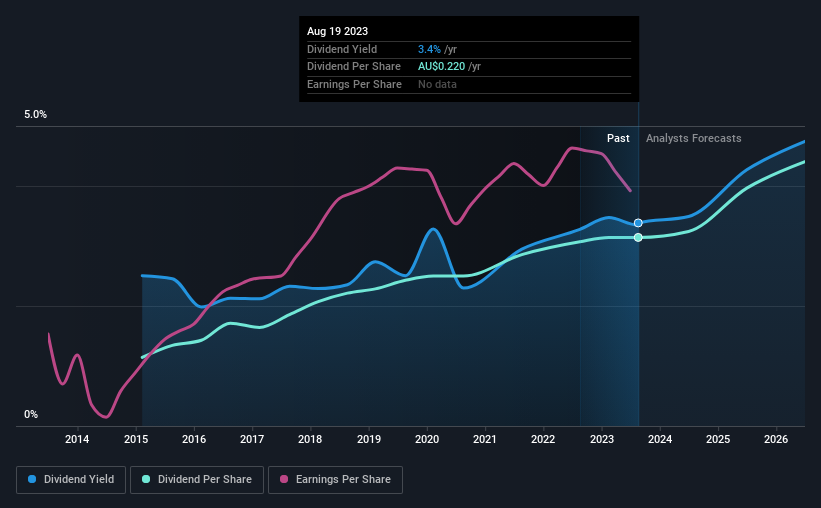Bapcor Limited (ASX:BAP) will pay a dividend of A$0.115 on the 19th of September. Based on this payment, the dividend yield on the company's stock will be 3.4%, which is an attractive boost to shareholder returns.
Check out our latest analysis for Bapcor
Bapcor's Dividend Is Well Covered By Earnings
While it is great to have a strong dividend yield, we should also consider whether the payment is sustainable. Prior to this announcement, Bapcor's dividend made up quite a large proportion of earnings but only 43% of free cash flows. This leaves plenty of cash for reinvestment into the business.
Over the next year, EPS is forecast to expand by 73.5%. If the dividend continues along recent trends, we estimate the payout ratio will be 35%, which is in the range that makes us comfortable with the sustainability of the dividend.

Bapcor Doesn't Have A Long Payment History
Even though the company has been paying a consistent dividend for a while, we would like to see a few more years before we feel comfortable relying on it. The dividend has gone from an annual total of A$0.08 in 2015 to the most recent total annual payment of A$0.22. This works out to be a compound annual growth rate (CAGR) of approximately 13% a year over that time. The dividend has been growing rapidly, however with such a short payment history we can't know for sure if payment can continue to grow over the long term, so caution may be warranted.
Dividend Growth May Be Hard To Achieve
Investors who have held shares in the company for the past few years will be happy with the dividend income they have received. Although it's important to note that Bapcor's earnings per share has basically not grown from where it was five years ago, which could erode the purchasing power of the dividend over time. There are exceptions, but limited earnings growth and a high payout ratio can signal that a company has reached maturity. When the rate of return on reinvestment opportunities falls below a certain minimum level, companies often elect to pay a larger dividend instead. This is why many mature companies often have larger dividend yields.
In Summary
Overall, we think Bapcor is a solid choice as a dividend stock, even though the dividend wasn't raised this year. While the payout ratios are a good sign, we are less enthusiastic about the company's dividend record. Taking all of this into consideration, the dividend looks viable moving forward, but investors should be mindful that the company has pushed the boundaries of sustainability in the past and may do so again.
Investors generally tend to favour companies with a consistent, stable dividend policy as opposed to those operating an irregular one. Still, investors need to consider a host of other factors, apart from dividend payments, when analysing a company. For example, we've picked out 1 warning sign for Bapcor that investors should know about before committing capital to this stock. Is Bapcor not quite the opportunity you were looking for? Why not check out our selection of top dividend stocks.
Valuation is complex, but we're here to simplify it.
Discover if Bapcor might be undervalued or overvalued with our detailed analysis, featuring fair value estimates, potential risks, dividends, insider trades, and its financial condition.
Access Free AnalysisHave feedback on this article? Concerned about the content? Get in touch with us directly. Alternatively, email editorial-team (at) simplywallst.com.
This article by Simply Wall St is general in nature. We provide commentary based on historical data and analyst forecasts only using an unbiased methodology and our articles are not intended to be financial advice. It does not constitute a recommendation to buy or sell any stock, and does not take account of your objectives, or your financial situation. We aim to bring you long-term focused analysis driven by fundamental data. Note that our analysis may not factor in the latest price-sensitive company announcements or qualitative material. Simply Wall St has no position in any stocks mentioned.
About ASX:BAP
Bapcor
Supplies vehicle parts, accessories, automotive equipment, and services and solutions in Australia, New Zealand, and Thailand.
Average dividend payer and fair value.
Similar Companies
Market Insights
Community Narratives




